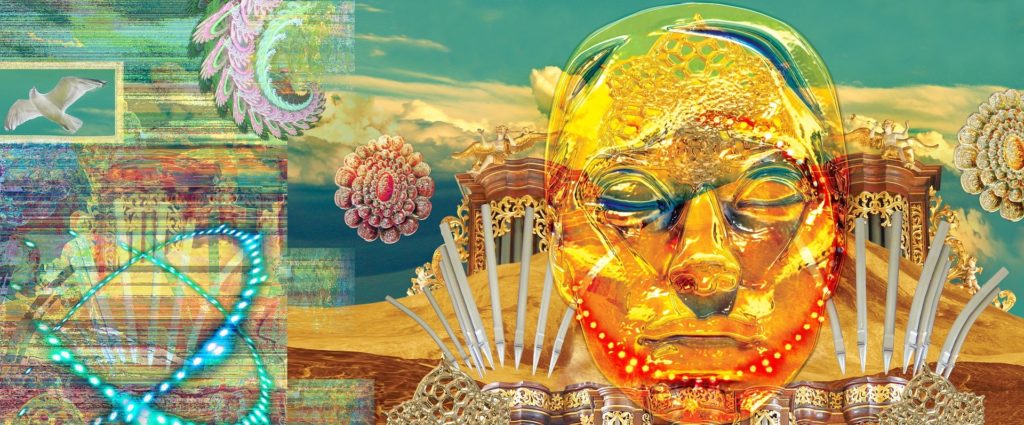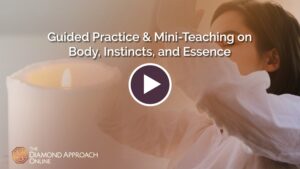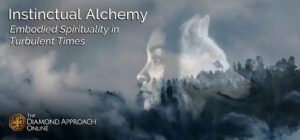Exploring Recognition of Presence

The definition of “recognize” that supports our exploration is: To perceive clearly: REALIZE; To conceive vividly as real: To be fully aware of.
The challenge is that the recognition of presence has nothing to do with the mind or concepts or history. Recognizing presence isn’t remembering presence as a mental recall. It’s not like a forgotten memory or a lost frame of consciousness. In recognizing presence, the veils of ego identification fall away, the self collapses, and that which is prior to the construction of self is now foreground, instead of obscured.
I remember one particular sequence of events that illustrated this understanding for me. It was when I was first dealing with the empty shell of egoic identity, before I knew the experience of essential realization. I was dealing with narcissism, hurt, and the need for mirroring, and feeling that my sense of self was empty, that there was nothing to me and I was unreal. I recognized my whole sense of identity as a sort of construct, a mental thing—which, of course, is not a theoretical experience when it is happening to you. I felt as if I were a figment of the imagination, as if what I believed to be me for all these years was not real. I understood the principles of inquiry and was looking into and feeling the emptiness and the spaciousness and, before I knew it, the feeling of losing myself and being empty and not knowing who I was revealed this brightness and simplicity and timelessness. The recognition of that simplicity as what I was, in a much more profound way than I had understood before, is what I call the experience of the condition of self-realization; it was for me the beginning of recognizing true nature as what I am. I was this point of light and presence recognizing itself. – A.H. Almaas, Runaway Realization, Ch. 5
The great challenge in recognizing presence is the aftermath of the recognition, which is when the mind reifies, conceptualizes, and commits the lived experience to memory. We can’t “recall” presence from mental content. It’s a misunderstanding to think, “I experienced presence.”
There is no “I” experiencing presence, there is presence. Referring to the experience of presence is more a reflection of the influence of and expression of presence in the body/mind process. But that is not presence but rather the affect and effects of presence.

When we recognize something, we usually encapsulate it, we make it into an object, reify it, remember it, and then project it onto the present—all of which excludes the immediacy of our experience. We are, as a result, perceiving our experience through the reifications. No longer are we recognizing reality freshly. When we first recognize something—before the reification happens—the recognition is immediate. It is a felt, full sense of experiential knowing of what is. This immediate discernment is alive and unmediated by past experience. Meeting reality in this way is necessary in order to be a full human being; without it, our potentialities will become limited. We will continue to perceive our experience based on a reified reality that cuts us off from the direct knowing of life. – A.H. Almaas, The Unfolding Now, Ch. 16
Presence is the I AM that Nisargaddata Maharaj refers to, and it is also the answer to Ramana Maharshi‘s question for students: Who am I?
The I AM of “Who am I?” is not what can be seen. It is the seeing, the dynamic awareness at the root of existence. The seeing cannot be the seen. It cannot turn around and look at itself because it is not the seer or the seen, but the seeing.

By going from relative to essential truth, we travel to another dimension and recognize a new way of knowing. If we continue in this dimension (the second journey), we find out that the new way of knowing is not that new. Basic knowledge always underlies our ongoing experience, but we could not see it before, because of the usual dualities in our mind between the observer and the observed. We usually think, “The knowingness is in me as I observe my body,” instead of recognizing that there is knowingness that is itself the body. The moment you recognize Essence, it is possible to transcend that duality. In knowing Essence, we begin to recognize basic knowledge, and we embark on a journey into a new way of knowing, a direct and immediate knowing. – A.H. Almaas, Spacecruiser Inquiry, ch. 6
Recognizing presence is recognition of existence. Can you sense the existence underlying you? Is it possible to let go of naming and the need to verbalize what is being apprehended, and to simply feel the existential sense of what we might call “our experience?”
It is simplicity itself enmeshed in chaos. This is why it all boils down to the in-the-moment practice of Sensing, Looking and Listening, which are simply a few of the gateways of seeing, or what we might call ‘awaring’ or dynamic awareness.

When we apprehend consciousness in itself, independently of the function of consciousness of objects, we experience presence. The term field of consciousness is an attempt to describe the ontological presence of the soul, her being. Furthermore, as we recognize that consciousness is fundamentally presence, the knowledge of our depth begins to open up. This is because our inner depth is nothing but the experience of our consciousness, and presence is nothing but the nature of this consciousness. Recognizing presence teaches us a great deal about consciousness, soul, and essence of soul. In this recognition, we can know ourselves in our fundamental mode of existence. We begin to see, perhaps for the first time, that what we are is more fundamental than all the content of our experience. We are more fundamental than our sensations, feelings, emotions, thoughts, images, symbols, ideas, concepts, and so on. We awaken to our essential nature, which is more fundamental and more basic than our body, heart, and mind. We experience the fabric that is ontologically fundamental, necessary for the existence of all that we have taken to be ourselves. We begin to recognize our real self, our soul. More precisely, by recognizing presence we become aware of the fundamental ground of our soul; we discover the inner fabric that holds all of our experience; we are enlightened to what we are beyond time and space. -A.H. Almaas, The Inner Journey Home, Ch. 3

Open Window: Teaching and Practice
We have been hearing from people in our global community how much the tumultuous international events of this time are impacting them. So again this month we are sharing a teaching excerpt and practice from the Spirituality in a Fractured World course that you can

Fractured Unity: Teaching and Practice
To support our global community, we want to share a teaching excerpt and practice from the Spirituality in a Fractured World course that you can do at home today. Past participants in the SFW course have said the teachings and related exercises had a tremendous
Sanctuary in the Storm
https://vimeo.com/1051651200 Enjoy this free video recording of our January 26, 2025 webinar with Diamond Approach founders A. H. Almaas (pen name of Hameed Ali) and Karen Johnson to explore how we can deepen our inner stability, stay rooted in realization, and bring beauty to stormy
2024: A Year of Harmonizing Our Animal and Spiritual Nature
This year’s theme of exploration was designed to meet us exactly where we are – amidst the very human challenges we face every day. Escalating conflict, an epidemic of disconnection, global instability – everywhere we look we see the unconscious expression of our primal animal instincts playing out

Embodying the Love of Truth
What does it mean for this life in a human body to be all that it can be—for the truth of our inner nature to come forward and be how we live? We each have a unique relationship with our body that includes both

Instinctual Alchemy
https://vimeo.com/1013218117/2104c40e8f?ts=0&share=copy Enjoy this free video recording of our September 22, 2024 webinar with Diamond Approach teachers Linda Krier and Jessica Britt for a critical, timely, and new teaching on the powerful synergy between body, instincts, and spirituality that allows us to be more authentically available
